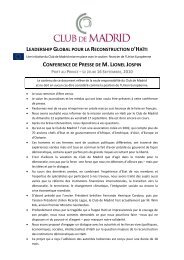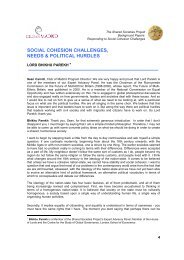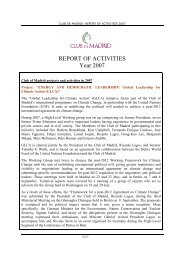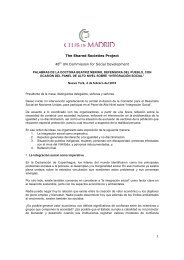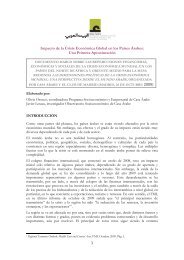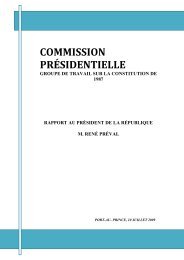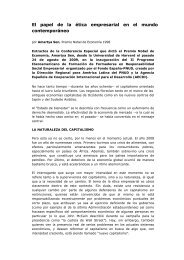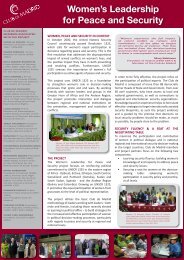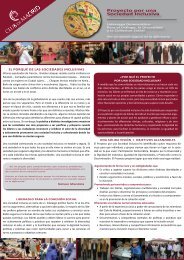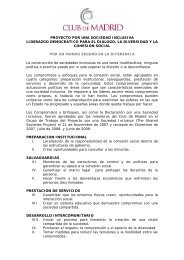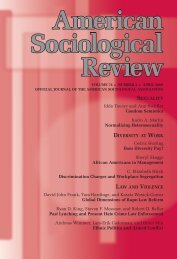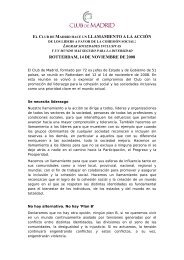Investing cultural diversity and intercultural dialogue - Business and ...
Investing cultural diversity and intercultural dialogue - Business and ...
Investing cultural diversity and intercultural dialogue - Business and ...
You also want an ePaper? Increase the reach of your titles
YUMPU automatically turns print PDFs into web optimized ePapers that Google loves.
10 . PART I – CULTURAL DIVERSITY: WHAT IS AT STAKE?<br />
Inter<strong>cultural</strong><br />
<strong>dialogue</strong> requires<br />
the empowerment<br />
of all participants<br />
through capacitybuilding<br />
<strong>and</strong><br />
projects that foster<br />
interaction without<br />
a loss of personal or<br />
collective identity<br />
L Preparing for the<br />
traditional polyphony,<br />
dances <strong>and</strong> rituals, the<br />
Shoplouk region, Bulgaria<br />
I A man in Niamey, Niger<br />
Rather than knowledge of others, what determines the<br />
success of inter<strong>cultural</strong> <strong>dialogue</strong> is the basic ability to<br />
listen, cognitive flexibility, empathy, humility <strong>and</strong><br />
hospitality. Accordingly, numerous initiatives aimed at<br />
fostering <strong>dialogue</strong> <strong>and</strong> empathy between young people<br />
from different cultures are being initiated, from school<br />
projects to educational <strong>and</strong> exchange programmes<br />
involving participatory <strong>cultural</strong>, artistic <strong>and</strong> sports<br />
activities. The arts <strong>and</strong> creativity in particular testify to the<br />
depths <strong>and</strong> plasticity of inter<strong>cultural</strong> relations <strong>and</strong> the<br />
forms of mutual enrichment they embody. They also<br />
help to combat closed identities <strong>and</strong> promote <strong>cultural</strong><br />
pluralism. Similarly, multi<strong>cultural</strong> practices <strong>and</strong> events<br />
such as ‘global city’ networking, carnivals <strong>and</strong> <strong>cultural</strong><br />
festivals can help to transcend barriers through<br />
experiences of urban communion <strong>and</strong> entertainment.<br />
Divergent memories have been the source of many<br />
conflicts throughout history. Although inter<strong>cultural</strong><br />
<strong>dialogue</strong> cannot hope to settle on its own all the conflicts<br />
in the political, economic <strong>and</strong> social spheres, a key<br />
element in its success is the building of a shared memorybase<br />
through the acknowledgement of faults <strong>and</strong> open<br />
debate on competing memories. The framing of a<br />
common historical narrative can be crucial in conflict<br />
prevention <strong>and</strong> post-conflict strategies, in assuaging<br />
‘a past that is still present’. South Africa’s Truth <strong>and</strong><br />
Reconciliation Commissions <strong>and</strong> national reconciliation<br />
processes in Rw<strong>and</strong>a are recent examples of the political<br />
application of such a healing strategy. The showcasing of<br />
‘places of memory’ – such as the Robben Isl<strong>and</strong> Prison in<br />
South Africa, the Mostar Bridge in Bosnia <strong>and</strong> the Buddhas<br />
of Bamyan in Afghanistan – likewise demonstrates that<br />
what distinguishes us can also serve to unite us, in<br />
contemplation of testimonies to our common humanity.<br />
Empowerment<br />
The promotion of inter<strong>cultural</strong> <strong>dialogue</strong> converges<br />
significantly with the ‘multiple identities’ approach.<br />
Dialogue should be seen not as involving a loss of self but<br />
as dependent upon knowing oneself <strong>and</strong> being able to<br />
shift between different frames of reference. It requires the<br />
empowerment of all participants through capacitybuilding<br />
<strong>and</strong> projects that permit interaction without a<br />
loss of personal or collective identity. This also involves<br />
recognizing the ethnocentric ways in which mainstream<br />
cultures have often proceeded <strong>and</strong> making room for<br />
systems of thought that recognize both ‘exoteric’ <strong>and</strong><br />
‘esoteric’ forms of knowledge. A noteworthy example in<br />
this regard is community mapping, which has been very<br />
successful in helping to empower indigenous populations<br />
to regain internationally their rights to ancestral l<strong>and</strong>s <strong>and</strong><br />
resources <strong>and</strong> self-determined development.<br />
A major obstacle to the accommodation of new voices<br />
in the sphere of inter<strong>cultural</strong> <strong>dialogue</strong> is the pervasive<br />
subordination of women to male-dominated<br />
interpretations of <strong>cultural</strong> <strong>and</strong> religious tradition. In many<br />
social contexts, women have a distinctive role to play in<br />
the promotion of <strong>cultural</strong> <strong>diversity</strong>, since they are often<br />
the ‘value carriers’ in the transmission of language, ethical<br />
codes, value systems, religious beliefs <strong>and</strong> behavioural<br />
patterns. Gender inequality is multidimensional <strong>and</strong><br />
interacts with racial, social, economic <strong>and</strong> other forms of<br />
inequality in insidious ways.<br />
The key to successful inter<strong>cultural</strong> <strong>and</strong> interfaith <strong>dialogue</strong><br />
lies in the acknowledgement of the equal dignity of the<br />
participants. This presupposes recognition of – <strong>and</strong><br />
respect for – diverse forms of knowledge <strong>and</strong> their modes<br />
of expression, the customs <strong>and</strong> traditions of participants,<br />
<strong>and</strong> efforts to establish a culture-neutral context for<br />
<strong>dialogue</strong> that enables communities to express themselves<br />
freely. This is especially true of interfaith <strong>dialogue</strong>.<br />
Interfaith <strong>dialogue</strong> is a crucial dimension of international<br />
underst<strong>and</strong>ing <strong>and</strong> thus of conflict resolution. Beyond<br />
institutional exchanges between authoritative or<br />
representative figures, interfaith <strong>dialogue</strong> aimed at<br />
reconciling different viewpoints should seek to integrate<br />
exchanges of all kinds, including through informal local<br />
<strong>and</strong> community networks, <strong>and</strong> to involve new partners,<br />
especially indigenous populations, women <strong>and</strong> youth.



